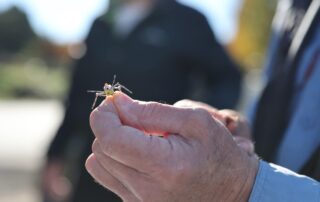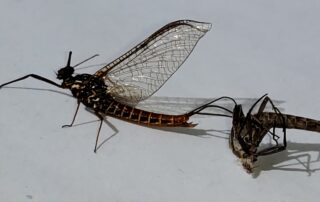Grasshopper
Here's a grasshopper fly. Into the warmest months of Tasmania's summer, grasshoppers are a feature on rivers and lakes. This is a foam bodied hopper that will float all day, and imparted with the right sort of movement, twitch twitch, bringing it to life, is a highly effective dry fly technique.
Life Cycle of the Tasmanian Mayfly
In Tasmania, developing a sense around what trout foods are available, where and when, increases the chances for success. Mayfly are in full swing from September/October on the lakes and rivers of the lowlands. The highlands follows a little later due to its altitude and climate. These mayfly hatches continue through to around March, peaking again on the lowlands through to the end of April and the season's close. Altitude plays a major role along with water and air temperature; changing light conditions, i.e. cloud cover; and wind and climate. Nymph The Nymph Nymphs live in the water [...]
Tungsten Beaded Nymph – wet fly
Tungsten Beaded Nymph - wet fly Nice small, quick sinking nymph that would probably be amongst its variants a most reliable upstream nymphing pattern and can be suspended below a buoyant dry fly, Royal Wulff or grasshopper etc. Hook: size 16 Body: pheasant tail Tail: pheasant tail Thorax: pheasant tail mixed with a little colour of antron Back to Trout Flies
Guitar String Nymph – wet fly
Guitar String Nymph - wet fly This wet fly is basically a fairly large bead headed nymph using the brass bead from a discarded guitar string (or course, a regular bead works fine too!). I like to experiment with things I have around. I first used this nymph in clear fast water upstream nymphing and found that it did quite well consistently taking fish. Its nature is to ride through the gravel and bounce around amongst the stones, so it really does get right into the slower zone, close to the stream bed. It fits in quite well with some [...]
Tups Indispensable – dry fly
Tups Indispensable - dry fly This fly is truly witchcraft! One of our favourites, it can be used in such a wide variety of situations. Float it. Sink it. Fish it in a beetle fall. Fish it in a spinner hatch. Fish it as an emerging sedge. One of every size in your fly box! Hook: size 12 – 16 Tail: honey dun hackle fibres Body: sparse, fine yellow silk, waxed Thorax: dubbed rams wool Hackle: honey dun fibres
Scruffy Jassid – dry fly
Scruffy Jassid - dry fly Usually after Christmas jassids will show somewhere, and in some years populations explode. Don’t be out there without this pattern in your fly box. Trout love jassids like Fiona loves chocolate! Place it 5 – 6 feet in front of a rising or feeding trout, one twitch, be ready for a hook up! The cycle appears to be several years. Hook: size 12 – 14 Body: red seals fur Wing case: black synthetic raffia Hackle: olive grizzle or black
Royal Hair Wing Coachman / Wolf – dry fly
Royal Hair Wing Coachman / Wolf - dry fly Great as an indicator when fishing a nymph. Also fished as a grasshopper in summer. A good ant imitation on lakes. Easily seen, readily taken. A great stream fly. Hook: size 12 – 16 Tail: golden pheasant tippet Body: peacock hurl, segmented by red floss silk Hackle: ginger cock Wing: traditionally calf tail is used, we like to use white antron as it’s sparse, doesn’t absorb water and it sparkles
Great Lake Beetle – dry fly
Great Lake Beetle - dry fly A good floater, highly visible. Works well when gum beetles are present on Great Lake, and of course other waters. Hook: size 12 Body: black deer hair or black cock hackle trim Wing: dyed orange upright Hackle: dyed orange cock
Brown Dun – Dry Fly
Brown Dun - Dry Fly The full adult brown dun mayfly can be good when the fish are genuinely on the top. It can be greased up to hang low in the water and is also useful as an emerger. Hook: size 12 Tail: ginger cock fibres Body: brown seals fur, or similar Wing: speckled hen Palmer & Hackle: ginger cock
Black Smut – Dry Fly
Black Smut - Dry Fly Fished in the film during a chironomid hatch, with the upper hackles greased, often very productive! It's only tied half way down thereabouts on the hook shank, so as to give a sparse silhouette, yet maintain a reasonable size hook strength. I found it works well when any small black stuff is around on the water, like caenid, chironomid, ants. Hook: size 16 Tail: elongated black cock squirrel fibres Body: tied short with black silk, 2/3 of the shank length Hackle: few turns of dark olive or black cock (grizzle optional)


